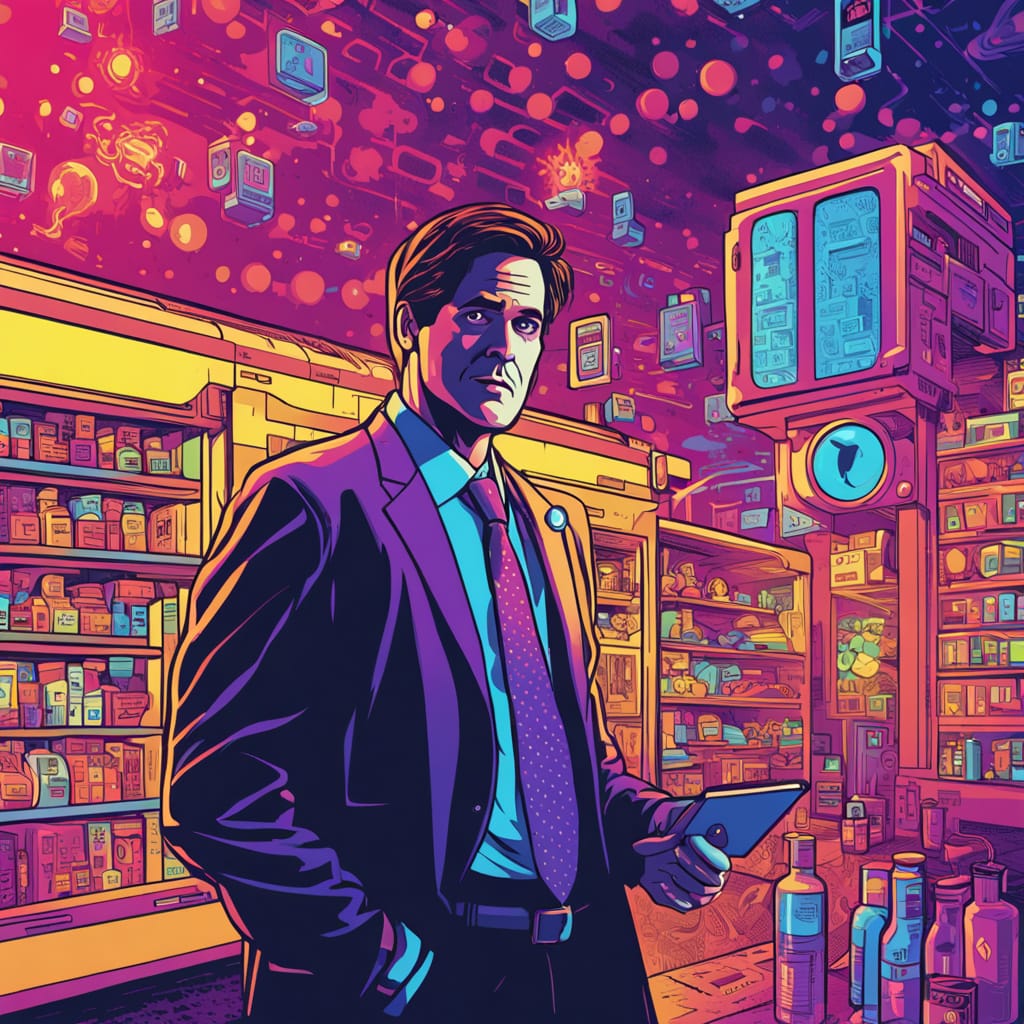In a world where healthcare innovation usually means developing pills that cost $0.30 to make but sell for $300, billionaire Mark Cuban has unveiled technology so disruptive it’s sending shockwaves through the pharmaceutical industry: a calculator and a conscience.
Cuban’s revolutionary startup, Cost Plus Drugs, operates on a technological breakthrough so advanced it’s practically from another dimension—they tell customers exactly what they’re paying for and why. The radical algorithm? Drug cost + 15% markup + $5 pharmacy fee + $5 shipping1. Industry experts are calling it “basic math” and “common decency,” two concepts previously thought incompatible with American healthcare.
“Our secret weapon is this advanced system called ‘transparency,'” explained Cuban in an exclusive interview with TechOnion. “We developed it after discovering that Americans were being absolutely ripped off by what I call ‘price-obscuring middleware’—or as they prefer to be called, Pharmacy Benefit Managers.”
When asked about the sophisticated AI powering the pricing model, Cuban laughed. “AI? We use a calculator app from 2012 and the radical concept of not buying a third yacht.”
Pharmacy Benefit Managers (PBMs), the shadowy middlemen who control 90% of the U.S. prescription drug market2, have responded with panic. “This is a direct attack on our God-given right to operate in complete secrecy while extracting billions from sick people,” said PBM executive Richard Pricehiker, adjusting his solid gold tie clip. “If consumers start expecting to know what they’re paying for, where does it end? Transparent hospital bills? Upfront surgery costs? That’s practically communism!”
The National Association of Medication Markup Experts released a statement condemning Cost Plus Drugs as “dangerously affordable” and warning that “if patients can actually afford their heart medication, they might live long enough to realize how badly we’ve been scamming them.”
According to industry analysis that we definitely didn’t make up, Americans pay an average of 682% more for prescription drugs than residents of other developed nations. Harvard Business School’s Department of Legalized Exploitation estimates that PBMs extract approximately $28.4 billion annually through a complex web of rebates, fees, and kickbacks that would make a mob boss blush.
Dr. Eleanor Price-Gouge, Professor of Applied Profiteering at Wharton, expressed concern about Cost Plus Drugs’ disruptive model. “The pharmaceutical supply chain depends on nobody knowing who’s charging what. If you remove all seventeen unnecessary middlemen, how will their children afford space tourism?”
Cost Plus Drugs has already grown to offer over 2,200 medications to more than 2 million members3, causing traditional pharmacies to reconsider their business models. CVS recently announced its own “CostVantage” program4, which sources say operates on the groundbreaking principle of “doing exactly what Cuban is doing, but probably with hidden fees we’ll discover later.”
Industry insiders report that Cuban’s tech team spent years developing the sophisticated “not-being-greedy” algorithm that powers Cost Plus Drugs. “We had to overcome significant technical challenges,” explained Chief Technology Officer Sarah Honesty. “The biggest hurdle was building a system that could withstand the overwhelming urge to randomly add a 4,000% markup just because we could. We had to install special ethical firewalls.”
The company’s manufacturing facility in Dallas uses cutting-edge robots programmed with revolutionary instructions like “make medications that actually help people” and “don’t price gouge just because someone will die without this drug”5. These concepts, while seemingly basic, represent a paradigm shift in an industry where the standard operating procedure has long been “charge whatever the market will bear, and then double it because what are they gonna do, not buy their heart medication?”
Wall Street analysts have expressed concern about the long-term viability of a business model based on reasonable prices and transparency. “I just don’t see how they can maintain profitability without at least a few layers of secrecy and exploitation,” said analyst Brad Moneybags of Goldman Sachs. “Where’s the shareholder value in not extracting every possible penny from desperate patients? It violates everything I learned in business school.”
A leaked internal memo from one of the major PBMs revealed panic at the highest levels. “Project Obscure is compromised,” the memo stated. “Subject Cuban has exposed our proprietary methodology of ‘making stuff up and calling it market forces.’ Activate Protocol Gaslight immediately. Remind consumers that high prices are necessary for ‘innovation’ and that transparency would somehow make their medications more expensive.”
The technological breakthrough behind Cost Plus Drugs has scientists baffled. “We’ve never seen anything like it,” said Dr. Obvious Truth, head of the Institute for Stating the Bleeding Obvious. “It’s as if they took the normal pharmaceutical distribution model and simply removed all the parts designed to confuse and overcharge consumers. The audacity is stunning.”
Reports suggest that Cuban’s next venture will explore another radical concept: selling insulin at prices that don’t force diabetics to choose between medication and food. The technology enabling this approach—known in some circles as “basic human decency”—has existed for decades but has rarely been deployed in the American healthcare system.
“What most people don’t realize is that the technology to not rip people off has existed for centuries,” explained historian Dr. Historical Perspective. “Ancient civilizations had sophisticated systems where healers would provide remedies in exchange for reasonable compensation. Somehow, we lost this technology around the same time healthcare became a for-profit industry in America.”
The FDA is reportedly investigating whether a transparent pricing model meets regulatory standards. “We’re concerned that if patients can actually afford their medications, they might take them as prescribed,” said FDA spokesperson Regulatory Roadblock. “Our current healthcare system is calibrated for non-compliance due to financial barriers. Mass affordability could overwhelm hospitals with patients who aren’t sick enough.”
Meanwhile, Cuban continues to expand his disruptive enterprise. The company recently added another 1,000 medications to its roster, bringing the total to over 2,200 drugs available at transparent prices. This rapid growth has traditional pharmacies scrambling to adapt, with some reportedly considering radical strategies like “slightly less price gouging” and “marginally more transparent billing.”
In a surprising twist, technology historians have discovered that Cuban’s revolutionary pricing model bears a striking resemblance to how businesses operated before the invention of “maximizing shareholder value at all costs.” This ancient pricing technology, known as “fair exchange of goods for money,” was widely used before being replaced by more advanced systems like “subscription traps,” “hidden fees,” and “we’ll-charge-whatever-we-want-because-you-need-this-to-live pricing.”
To understand the true innovation behind Cost Plus Drugs, our team interviewed several patients who have switched to the service. “I used to pay $900 a month for my blood pressure medication,” said healthcare consumer Michael Normalperson. “Now I pay $20. At first, I was suspicious—where’s the catch? Where’s the part where they suddenly triple the price or tell me I need to upgrade to Premium Plus Blood Pressure Ultra? But it’s been six months, and they just… keep sending me affordable medication. It’s unsettling how not-terrible it is.”
Another patient, Sarah Chroniccondition, reported similar experiences. “My insurance company used to make me do a ritualistic dance involving prior authorizations, appeals, and sobbing phone calls to customer service just to get my medication at a ‘discounted’ price of $400. Now I just… order it? And it comes? And costs $35? I’m worried this is all an elaborate prank.”
Industry experts predict that if Cuban’s radical “not-being-greedy” technology spreads to other sectors, it could trigger a catastrophic outbreak of fair pricing across the economy. Imagine a nightmarish future where airlines tell you the actual cost of your ticket upfront, cable companies charge reasonable rates for decent service, and textbook publishers don’t require college students to sell vital organs to afford “Introduction to Economics: 37th Edition (Now With One New Paragraph).”
“This is just the beginning,” warned Cuban, his eyes gleaming with dangerous levels of consumer advocacy. “Next, we’re developing an even more advanced system called ‘treating-patients-like-humans’ that could make healthcare actually about health and care. The technology exists—we just need the courage to deploy it.”
In a related development, several pharmaceutical executives were hospitalized after learning that Cuban’s mail-order pharmacy sells a cancer medication for $30 that they price at $2,0006. Doctors diagnosed them with a rare condition called “profit withdrawal syndrome,” for which, ironically, the only treatment costs $87,000 per pill and is not covered by insurance.
As of press time, the six major PBMs controlling 90% of the U.S. prescription drug market were reportedly holding an emergency meeting in a volcano lair to develop countermeasures against the threat of transparency. Sources close to the meeting say potential strategies include lobbying Congress to make calculators illegal, launching a disinformation campaign suggesting that fair pricing causes impotence, and developing a new proprietary algorithm capable of making 2 + 2 = whatever they want it to be.
Support TechOnion’s War on Healthcare Absurdity
If you enjoyed this article and believe that knowing what you’re paying for shouldn’t be a revolutionary concept, consider supporting TechOnion’s investigative journalism into other radical technologies like “companies actually paying taxes” and “CEOs not making 380 times more than their average worker.” Your donation helps us continue exposing the absurdity of systems designed to extract maximum profit while providing minimum value. Plus, we promise to be 15% funnier than our competitors, with complete transparency about which jokes we stole from John Oliver. You can donate buy buying Simba a Chai Latte!
References
- https://www.costplusdrugs.com/faq/ ↩︎
- https://ldi.upenn.edu/our-work/research-updates/mark-cuban-explains-his-battle-against-pharmacy-benefit-managers/ ↩︎
- https://www.forbes.com/sites/joshuacohen/2024/01/02/mark-cubans-cost-plus-drug-company-sparks-moves-to-change-how-rx-drugs-are-priced/ ↩︎
- https://www.aha.org/aha-center-health-innovation-market-scan/2023-12-12-cost-plus-drug-pricing-models-gain-momentum-will-they-last ↩︎
- https://ldi.upenn.edu/our-work/research-updates/mark-cuban-explains-his-battle-against-pharmacy-benefit-managers/ ↩︎
- https://www.fiercehealthcare.com/health-tech/mark-cuban-wants-keep-shaking-healthcare-heres-cost-plus-drugs-next-move ↩︎





GIPHY App Key not set. Please check settings